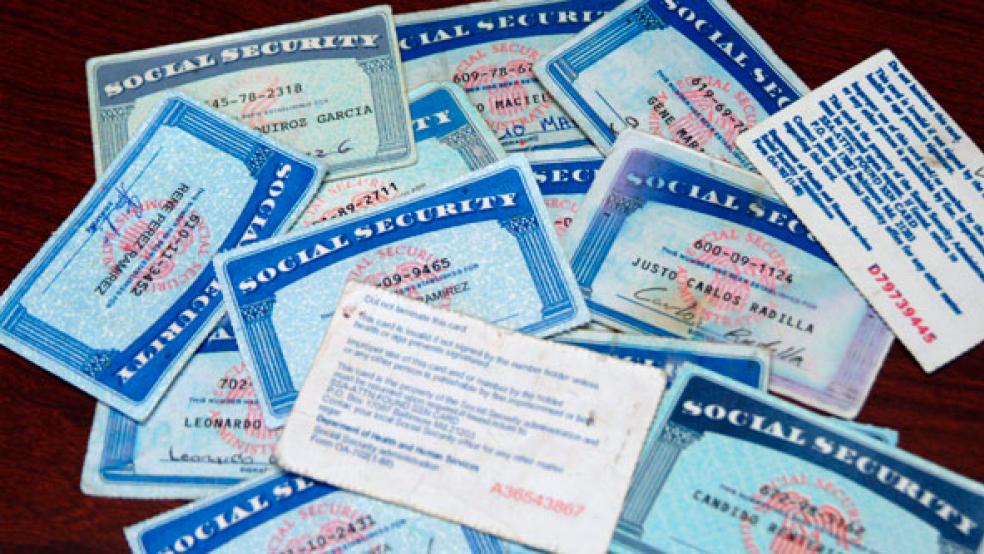With growing outrage over billions of dollars of Social Security fraud – from phony disability insurance claims to retirement payments for deceased beneficiaries – Congress is about to approve a major crackdown that includes harsher criminal and civil penalties and fines.
Related: New Evidence That Disability Fraud Costs Billions
The reforms include the creation of a new felony specifically for conspiracy to commit Social Security fraud that is punishable by up to five years in prison and fines of up to $250,000. The reforms would also provide even stiffer penalties of from five to 10 years in prison for individuals in positions of trust, such as claimant representatives, doctors and other health care providers or current or former employees of the Social Security Administration.
Those persons of trust could also be slapped with civil monetary penalties of from $5,000 to $7,500 for each false statement or omission they make to advance a fraudulent transaction. Disability insurance recipients could also lose their benefits if they are found to have been concealing work activity or misrepresenting their physical or mental conditions.
The new, harsher penalties were inserted in the 140-page two-year budget and debt ceiling agreement that was unveiled late Monday by House Speaker John Boehner (R-OH), House Minority Leader Nancy Pelosi (D-CA) and the White House. The House is expected to take up the budget legislation on Wednesday and the Senate will act later this week at the earliest. The legislation also includes measures to bolster the sagging revenues in the Social Security Disability Insurance program and prevent a 20 percent, across-the-board cut in benefits for 11 million people.
Related: Audit Uncovers $124.7 B of Overpayments and Fraud in Medicare and Medicaid
As one indication of the extent of the problems with Social Security payments, between Oct. 1, 2014 and March 31 the Social Security’s Office of Inspector General received more than 65,900 allegations of fraud from SSA employees, Congress, law enforcement agencies and the public. OIG agents closed more than 3,800 criminal investigations during that period, leading to more than 280 arrests, over 380 indictments, 620 criminal convictions and over 140 civil judgement or civil monetary penalties.
“We are reporting over $469 million in investigative accomplishments, including over $160 million in SSA recoveries, restitution, fines, settlements, and judgments; and over $308 million in projected savings from investigations resulting in the suspension or termination of benefits,” Inspector General Patrick P. O’Carroll Jr. reported. “In addition, we participated in multi-agency investigations that resulted in over $22 million in savings, restitution, and recoveries for other agencies.”
There are roughly 59 million beneficiaries receiving monthly benefits checks. About 42 million of that total are retired workers, six million or more are survivors of deceased workers, and about 11 million are disabled beneficiaries. Overall, the Social Security Administration will pay out more than $800 billion in benefits payments this year.
One of the biggest problems involves the payment of monthly Social Security benefits to people who have died, with relatives or others continuing to collect and cash the checks. According to the IG’s report issued in March, investigators identified about 6.5 million individuals in the Social Security’s active database who would be age 112 or older – without any indication of whether they are still alive or dead. With an average U.S. life expectancy of 78.8 years, there’s more than a reasonable chance that most of those beneficiaries are deceased.
Related: Medicare Drug Program Still Plagued by Fraud
Moreover, the inspector general’s report said that between 2006 and 2011, individuals using nearly 67,000 Social Security numbers generated $3.1 billion in tips, wages and self-employment income. Yet the employees' or self-employed individuals' names didn't match the Social Security number account-holders' names.
In one case, an individual opened bank accounts using Social Security numbers for individuals born in 1869 and 1893. The Social Security’s official database of active numbers indicated that both beneficiaries were alive -- meaning they would be older than 145 and 121 years, respectively.
Sens. Ron Johnson (R-WI.), who chairs the Senate committee that oversees the Social Security Administration, declared in a statement: “It is incredible that the Social Security Administration in 2015 does not have the technical sophistication to ensure that people they know to be deceased are actually noted as dead.”
Another big problem are fraudulent claims for Social Security Disability Insurance payments by people who either are faking their disabilities or are hiding income from the government.
Related: Boehner’s Last Stand — A Budget Deal That Raises the Debt Ceiling
Last January, for example, a federal grand jury in Puerto Rico returned 39 separate indictments charging one doctor, Luis Escabi-Pérez, and 39 others of fraud in the application process for Social Security Administration (SSA) disability insurance benefits in Puerto Rico, according to Puerto Ricco’s U.S. attorney’s office.
Escabi-Pérez, a psychiatrist, submitted phony psychiatric medical reports to the SSA in support of applications for disability insurance benefits submitted by his patients, according to the FBI. He typically charged a $100 fee for a medical visit and $500 for the preparation and submittal of psychiatric medical reports to the SSA. “He would at times also charge additional fees of up to $5,000 to backdate medical records in order to create the appearance of a longer history of medical treatment.”
Congress and the Obama administration are also concerned about massive government losses through Medicare and Medicaid fraud. The Government Accountability Office in early October confirmed that Medicare and Medicaid fraud and overpayments were spinning out of control and posed a serious long-term budget challenge. In fiscal 2014 alone, 22 agencies approved improper Medicare, Medicaid and Earned Income Tax Credit payments totaling $124.7 billion —an increase of $18.9 billion or 15 percent from the previous year, according to the report.





